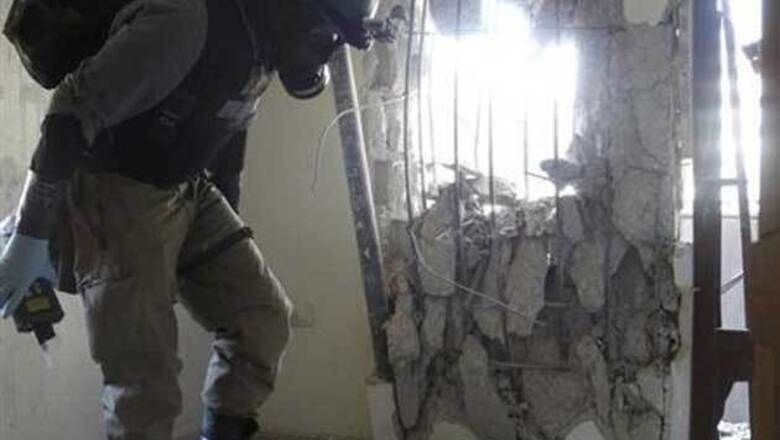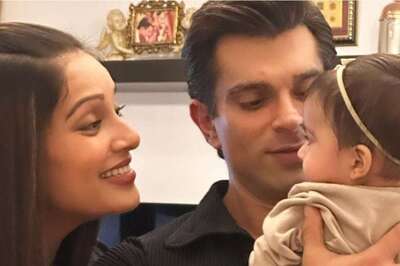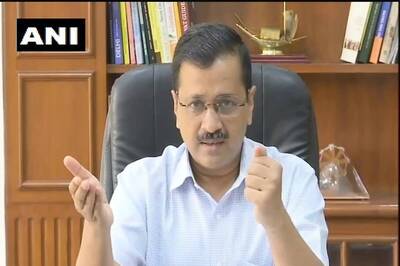
views
They've endured repeated delays, unrelenting scrutiny and even snipers' bullets in Damascus. Now UN inspectors, who have been gathering evidence of a possible chemical weapons attack in Syria, are poised to return to the Netherlands in coming days, setting in motion a meticulous process of analysing samples at specially accredited laboratories.
According to the team's UN mandate, the analysis will establish if a chemical attack took place, but not who was responsible for a deadly August 21 attack that Doctors Without Borders says killed 355 people and included the use of toxic gas. US Secretary of State John Kerry said on Friday that Washington knows, based on intelligence, that the Syrian regime carefully prepared for days to launch a chemical weapons attack.
UN Secretary-General Ban Ki-moon is expected to get an initial briefing on the UN team's work this weekend from disarmament chief Angela Kane. The team is expected to leave Syria on Saturday, but it remains unclear exactly how long the process of examining samples will take.
UN spokesman Martin Nesirky said the team has concluded its collection of evidence, including visits to field hospitals, interviews with witnesses and doctors, and gathering biological samples and environmental samples - and is now packing up and getting ready to leave Syria.
The Organization for the Prohibition of Chemical Weapons, which provided most of the 12-strong team of inspectors, has stringent guidelines for handling and testing samples at a chain of special labs around the world to ensure it delivers unimpeachable results - which could have far-reaching ramifications once they are reported at the United Nations in New York.
"It has to be accurate. The procedure has to be absolutely rigid and well-documented," former OPCW worker Ralf Trapp told The Associated Press on Friday.
Key to the procedure is a rock-solid chain of custody rules for the samples and analysis of each sample by two or possibly three different labs. The OPCW works with 21 laboratories around the world that have to pass a proficiency test each year to ensure their work meets the organization's standards.
Strictly documenting who has had custody of samples every step of their journey from the chaos of a Damascus war zone to the sterile serenity of a specially certified lab ensures that the material to be tested is what the inspectors say it is.
The labs, and even the inspectors themselves, will likely have been chosen from countries with a neutral stance on the Syrian conflict, experts say. Inspectors at the OPCW generally are analytical chemists and chemical weapons munitions experts.
Samples they gather are put in vials that are sealed and then put in a transport container that is also secured with a fiber-optic seal, said Trapp, who is now an independent disarmament consultant. Every time the container changes hands it is documented.
"A lot of stuff is built into the system to make sure nobody has tampered with the samples or replaced one with another," he said.
Once they have taken custody of the samples, chemists at the laboratories will test them for traces of chemicals banned under the Chemical Weapons Convention. The samples will be sent to two or three labs whose results will be cross-checked to ensure they match up, again reducing the chance of an inaccurate result.
The inspectors' mission has been shrouded in as much secrecy as is possible in Syria and will remain so once the team returns to the Netherlands.
There has been no official word on what type of samples they have gathered, but media reports suggest they collected soil that could be contaminated and swipes from munitions, along with blood and hair samples from victims and possibly even tissue from corpses, Trapp said.
Officials at the OPCW, headquartered in The Hague close to the UN's Yugoslav war crimes tribunal and the European Union's Europol police organization, say team members will make no comment on their return.
That means the first time their full findings are expected to be known will be after they are sent to UN headquarters in New York.
What remains unclear is when exactly that will happen. Trapp said the painstaking testing will take several days and the labs working on the samples won't sacrifice accuracy for the sake of quick results.
"In the current situation they would probably be pressed to speed up as much as they can, but there's always the risk if you speed it up too much that you will end up with results that could be contested by somebody," he said.




















Comments
0 comment